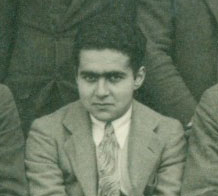
Experiment

IT WAS WHILST at Cambridge that he edited a literary magazine with William Empson (who was also a student mathematician) called Experiment which first appeared in 1928. Poetry, he wrote, was for him as early a love as mathematics [Ref.2]:
"I grew up to be indifferent to the distinction between literature and science, which in my teens were simply two languages for experience that I learned together."
Bronowski moved to London and also at one time lived in Paris, where he made the acquaintance of Samuel Beckett, to whom he had recommended his old lodgings off the Gray's Inn Road (at 4 Ampton St. and at which Beckett subsequently stayed). In 1930 Bronowski took over the preparation of the English and Irish sections of a wide-ranging poetry anthology European Caravan which had originally been intended to carry some of Beckett's translations of Italian poetry. These did not appear in the book, which was eventually be published in America. A third of part one (575 pages) consisted of prose and poetry selected by Bronowski.In part of his last year at Cambridge, before taking his doctorate, he went to live in Mallorca to be near the home of Robert Graves and Laura Riding through 1933.
Letter to his mother 8 July 1932We arrived here yesterday after over two days 3rd class journey (continuous) - the only merit of which were that it was cool through most of France because it poured with rain [...] it is a very old, very strangely fortified town in the mountains, whose parched brown bareness gives all that country a very awesome beauty. [The last stage of the journey had been a sea crossing of ten hours...]on a blue and silver-smooth sea from Barcelona to Palma, through a warm, star-bright night, and into a red sunrise over the mountainous north coast of this island. In Palma (the port of this island) we arrived and were met by Laura Riding and Robert Graves - both very delightful, self-possessed people, of whom more later. Then we drove from Palma through the unending olive plantations under the desolate mountains with palm in the villages and cactus by the roadside and huge stream beds full of boulders but no water. So over the ridge of the mountains and down to the sea again [...] and at Deya this house: it is the new house Laura Riding and Robert Graves have had built and certainly the most beautiful I have been in. You know the houses on the south coast of France; rectangular two-storey blocks with almost flat roofs, built thickly of stone and painted white - from the outside, then, a house like that... [He describes in great detail the pine and olive wood fittings of the house and even includes a little diagram of the kitchen.] As for those mountains and the Mediterranean - I feel I have spent so much time describing the house almost as a postponement of their beauty, so much more moving, so much more difficult to speak of. The bass stone of the hills showing through their sparse green shrubs; the terraces of olive trees; the enormous bay of blue: the vivid sun on the occasional houses; the sound of the men digging in the plantations, very clear in the southern silence here, erupt when they (rather disturbingly) sing at their work.
He went accompanied by Eirlys Roberts (see left-margin) who later organized Which magazines and became adept at making a fish and saffron stew.
He had admired the poetry of Riding and made enough useful comments that she gave him acknowledgment in her Epilogue I (1935). In Mallorca she was working on a large project called Critical Vulgate and Bronowski was among those employed to work in collaboration with her. It began happily enough, but Bronowski, never afraid to state his opinions, eventually came to reject Riding's poetical judgements and her also her elitism [Ref. 3].
Ultimately, they quarrelled, Bronowski calling her 'no lily-white angel' and, shortly after, he returned to England with Roberts. Graves had kept quiet all this time. He had found Bronowski smug and even disliked his company. There is a satirical poem he wrote at this time which may have been directly aimed at Bronowski and his ambition. It was originally entitled Jacob's Ladder but was subsequently retitled Dream of a Climber in the collection Work in Hand, 1942 [Ref. 4].
He will appear, not on the lowest rung
But nearly out of view, almost in the cloud, Leaning aside for an angel to pass.
Bronowski was also writing poetry of his own throughout this period (see left margin), though his accumulated collected poems, entitled The Thumb in the Margin, covering the period 1928-1940, failed to find a publsiher.
Enter Chapter 3 The Poet's Defence
Poems in Experiment RECOLLECTION:
Eirlys Roberts
A Cambridge magazine of new poetry, edited by Jacob Bronowski and William Empson.
Time of Life
A radio broadcast in which Bronowski recalls Experiment magazine.
Eirlys Roberts knew Jacob Bronowski at Cambridge and went with him Mallorca to stay with Robert Graves and Laura Riding. Here she recalls some of her impressions.

|
Copyright © 1997 by Stephen Moss. All rights reserved.
2. Wakeman, J., 1975 World Authors 1950 - 1970 (New York: H.W. Wilson) pp. 221 - 223.
3. Graves, R.P., 1990 Robert Graves - The Years with Laura 1926 - 1940 (London: Weidenfeld) p. 220.
4. Seymour Smith, M., Robert Graves: His life and Work, Hutchinson 1982, p.225.